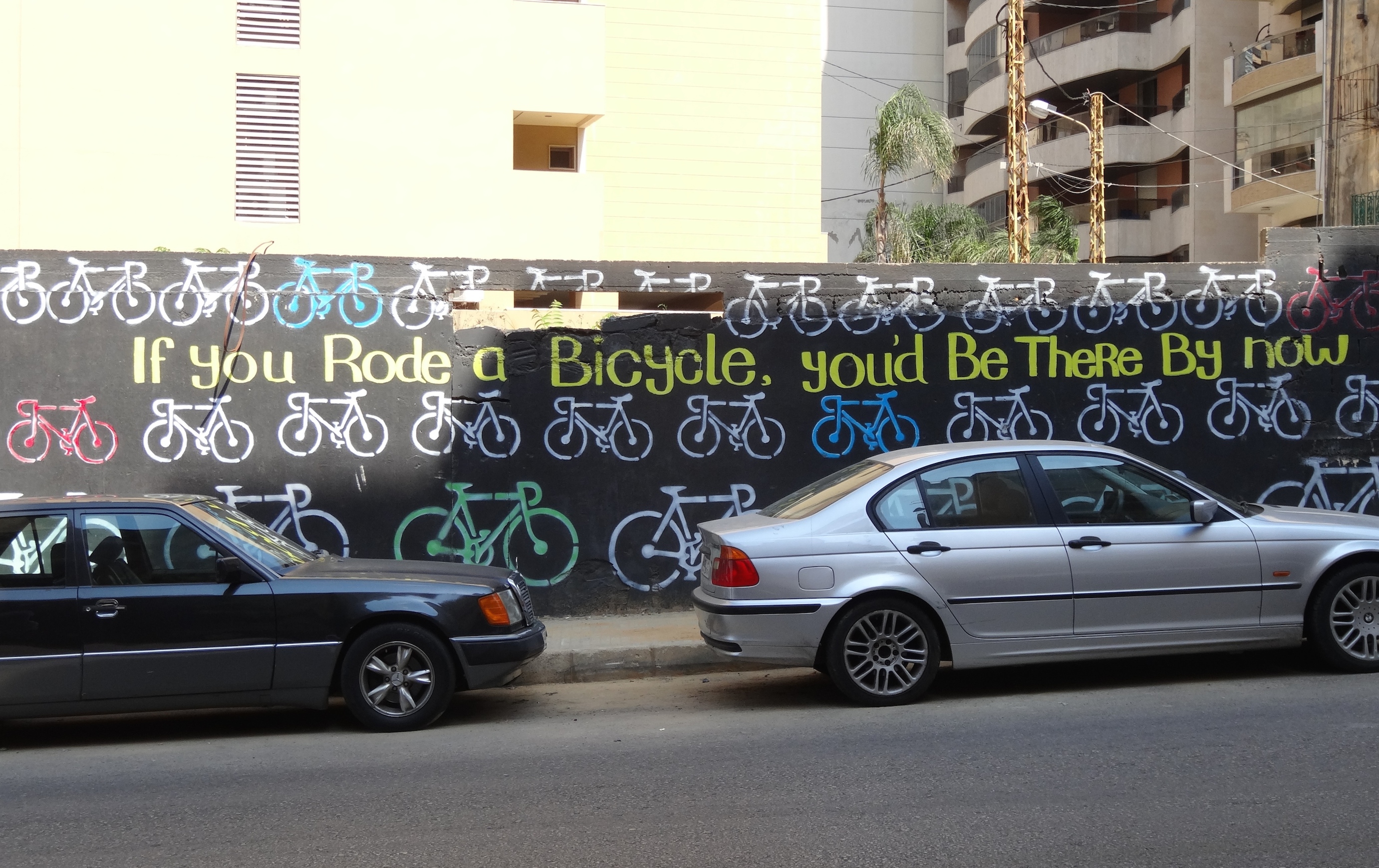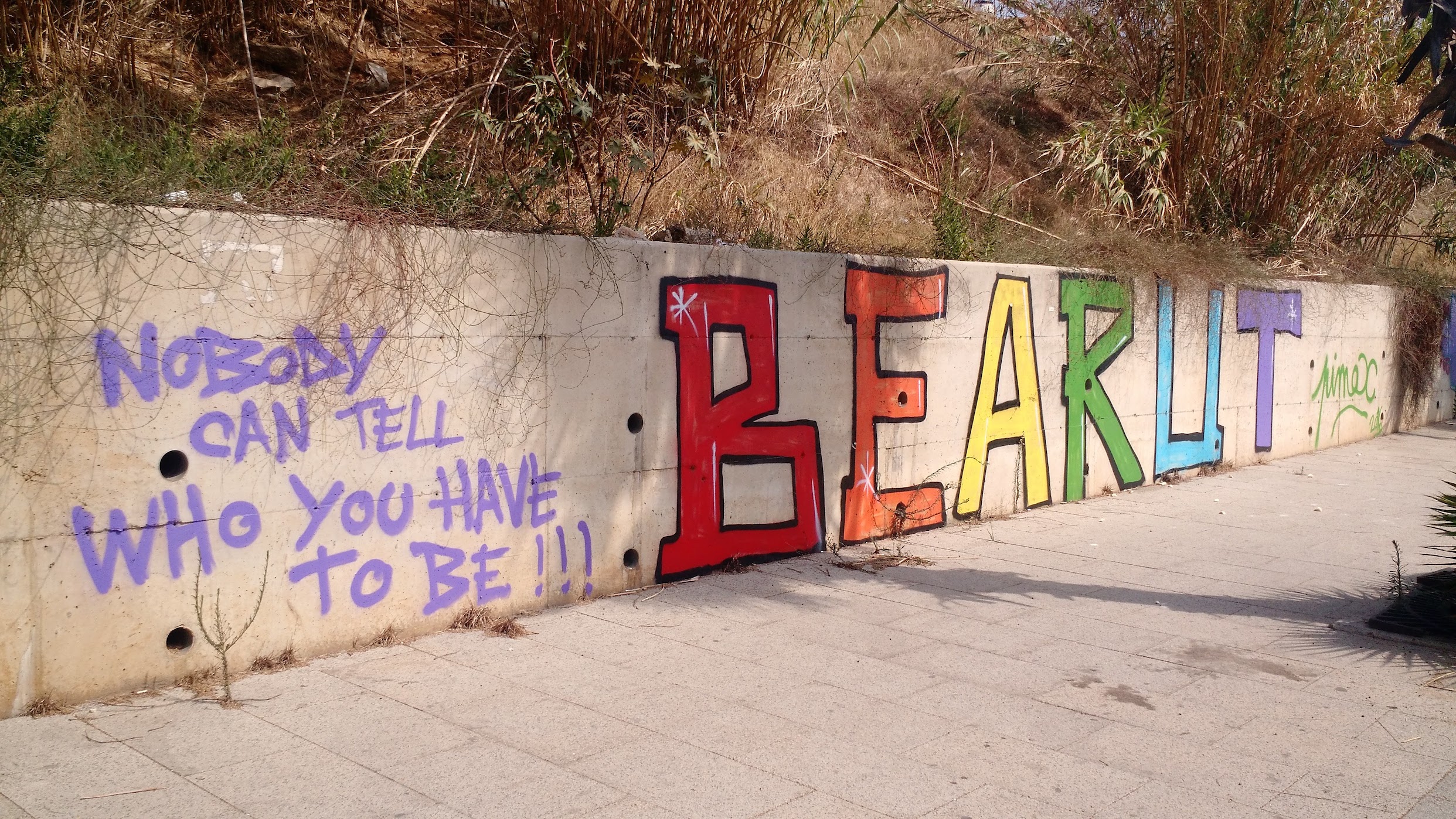Finding a taxi in Beirut is the easiest thing, especially for someone who looks like a foreigner. Without fail, every taxi driver that passes me as I’m walking down the street slows down, honks at me, and pauses for a beat to see if I need a ride. Most of these taxis can operate as either a private taxi or what is called a service taxi (pronounced “serveece”). The latter continues to pick up and drop off other passengers on its way to your destination and costs significantly less than a private taxi – usually about 2,000 Lebanese Lira, or $1.50. If there’s a lot of traffic or the destination is especially far (traversing East and West Beirut, for example), then it will cost “service-ein” – which translates to 2 services or 4,000 L.L. The availability of service taxis makes movement around the city incredibly easy and affordable.
Not long after I arrived to Beirut, I worked up the courage to speak to a driver in Arabic. As the car pulled up to me, I mustered all my confidence and said, “Service-ein a Gemmayzeh?” The driver glared at me, responded with a brusque “no”, and drove away. I remember this incident very clearly, because I stood on the sidewalk for a few minutes feeling completely shamed before finally deciding to avoid taxis and trek across the city on foot. For the rest of my stay in Beirut, I either walked to my destination or allowed my friends to negotiate with the taxi drivers. It’s such a stubborn thing to do, and I’m not egocentric enough to believe that his decline had anything to do with me or my abilities as a student of Arabic. Still, the more I reflect on it, the more I realize how frequently this pattern has emerged over the course of the summer. It has to do with the vulnerability of learning a new language and the ways I tend to struggle against it. I read an article not long ago about exactly this topic, and it was comforting to know that I’m not the only person running into these issues.
Whenever you start something new, no matter what it is, it’s likely that you won’t be very good at it right away. Maybe you’ll defy the odds and discover that you’re a prodigy, but most of the time it will take a lot of practice before you reach proficiency. And maybe you’ll never get there. I think we have all, to varying degrees, recognized and accepted this. And it’s fine, really. For a lot of hobbies, it’s easy enough to wait awhile before sharing your talents with the world. If I’m learning to play the violin, for instance, I could practice in my room until I reach that point where the screeching begins to resemble music. If I’m learning to draw, I can hide away my scribbles until I produce something that I’m proud of. But learning a new language doesn’t work the same way. It is necessarily an interpersonal and intercultural endeavor. It’s not a skill that can be learned well in isolation.
Language learning requires a period of time when you are going to pronounce letters incorrectly, mess up the grammar, and use the wrong words. You are going to say things that don’t make sense, and sometimes people will misunderstand you or revert to English to avoid the hassle. There will probably be cultural missteps, and at some point you will ask someone to repeat themselves over and over and over again, still unable to comprehend the words. And sometimes the way you speak will cause people to laugh at you. Practicing a language requires you to accept the fact that you are going to look a little silly from time to time. This isn’t something I thought about when I first decided to learn Arabic. It never occurred to me how often I would feel a bit foolish, or like a child, or like my personality has been stripped from me as I stand in an awkward silence, unable to express myself or understand those around me, making a mental note to learn how to say, “I swear, I’m not as incompetent as I seem right now.”
There are a number of students in my program who seem to be comfortable with this vulnerability. They show no fear or inhibitions as they converse in Arabic with as many people as possible, always looking for opportunities to practice, always forcing themselves to keep speaking. What’s incredible to me is that some of these people speak truly horrible Arabic. I stare in awe as they enter into conversations completely untethered, bumbling through their words and butchering pronunciation. When the person they’re speaking with laughs or corrects them, which happens frequently, they just smile and keep on going. These people are my heroes.
While I aspire to be this kind of learner, I more often fall into the category of people who obsess over grammar and carefully map out each sentence before speaking it aloud, making sure that it has been constructed perfectly. This has served me well for homework and exams, but it has proven to be a major hindrance to spoken communication. Before asking a question or making a comment, I find myself repeating it over and over in my head until it’s burned into my memory and can be reproduced exactly as I had practiced it. Even within the safety of a classroom I often end each comment with a raised intonation as if to check-in with the instructor and make sure that everything has been correctly stated and the intended meaning has landed. As if to signify, “I realize that there might be a mistake somewhere in this sentence, and I just want you know that I am already aware of it.” I can tell you with certainty that this is not an effective method for progressing in a language. I have been working dutifully all summer to try and break these habits.
As the weeks passed, I have definitely improved. Somewhere around Week 4, something clicked and I was suddenly able to follow along in class. The repertoire of things I am able to say without pausing to think first has probably tripled. And there is a small subset of Arabic words that I can now hear and immediately register without having to translate them. This has been immensely encouraging and has made it easier for me to stick with the work and keep going. Even with all this progress though, I am still trying to grant myself the freedom to look stupid. To happily make mistakes and laugh them off. I keep hoping that this is also something that will “click”. That one day I’ll suddenly be open and relaxed, shrugging off errors and putting myself out there. I am never going to see most of these people again, so what does it matter anyway? And do I really think that waitress in Hamra noticed or cared about the way I pronounce my ayins? Of course not. So let’s just vow to get over this. Language learning is not for perfectionists.

